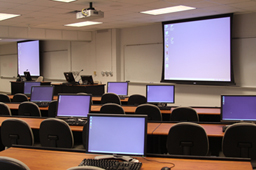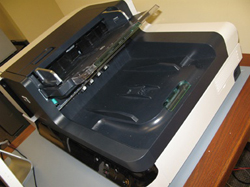TECHNOLOGICALLY ADVANCED:
K-STATE'S OFFICE OF INFORMATION TECHNOLOGY GIVES K-STATERS THE TECHNOLOGY THEY NEED
 K-State's office of information technology is constantly updating technology on campus. From the new e-mail system to adding hardware, it can be a challenge to keep track of the latest changes.
K-State's office of information technology is constantly updating technology on campus. From the new e-mail system to adding hardware, it can be a challenge to keep track of the latest changes.
So here's a rundown on various technology related items that changed over the summer or were completed in the late spring:
* K-State's full-service media production and distribution facility, the Educational Communications Center, has upgraded its satellite uplink capabilities to digital technology. The center can now digitally feed live or taped programs, interviews or raw footage that originates in house or on location. The use of digital satellite technology enables the distribution of real-time, high-quality audio and video to a geographically diverse audience. The center is the only noncommercial entity in Kansas with satellite uplink capabilities. In addition, video projects produced by the Educational Communications Center are now being done in high definition and the center is partnering with Fort Riley's Public Affairs Office, providing content for soldiers and their families that is televised on K-State TV.
 * This summer, four collaborative technology workstations were added to the Hale Library InfoCommons bringing the total number of units to eight. These mobile units are designed for group work so students don't have to crowd around one of the computer pods. Six of the units have a 32-inch LCD monitor and hookups for a laptop and a six-way audio splitter. Two additional stations are iGo systems with a 24-inch iMac with a Mac OS keyboard and mouse, in an all-in-one unit. In addition the InfoCommons saw the addition of 22 PCs and power adapters were added to five tables.
* This summer, four collaborative technology workstations were added to the Hale Library InfoCommons bringing the total number of units to eight. These mobile units are designed for group work so students don't have to crowd around one of the computer pods. Six of the units have a 32-inch LCD monitor and hookups for a laptop and a six-way audio splitter. Two additional stations are iGo systems with a 24-inch iMac with a Mac OS keyboard and mouse, in an all-in-one unit. In addition the InfoCommons saw the addition of 22 PCs and power adapters were added to five tables.
* K-State Online 9.0 was released July 18 and included many upgrades at the suggestion of faculty, staff and students. Improvements included: improved efficiency and load time of the Course Content tool and Message Board feature; a complete redesign of the Course Content feature, previously known as Manage Files; and a simplified way to grant assignment extensions. A complete list of K-State Online's changes can be found at http://public.online.ksu.edu/release_notes/ksol9/
* In late May, K-State switched to the Zimbra Collaboration Suite for enterprise e-mail. The new system is faster and has more powerful features and tools. For tips on using Zimbra, go to http://www.k-state.edu/infotech/e-mail/docs/zimbra/tips.html
Later this fall, K-State will begin testing the Zimbra Calendar, which will replace the K-State Oracle Calendar.
* Also, in the late spring, the Quantitative -- or Q -- Center was launched for the mathematics and physics departments in 144 and 145 Cardwell Hall. The Q Center, which was more than two years in the making, allows instructors to teach mathematics and physics classes in new and dynamic ways.
The Q center features: 20 computing workstations with specialized software for math and physics; software that allows faculty to  control the student computing workstations and share content from their desktop to assist students remotely; two instructor stations and an electronic dividing wall enable instructors to join or split classes as needed; a WACOM monitor and fully integrated touch screen serving as a virtual white-board for classroom use with each instructor station; and a ceiling-mounted document camera.
control the student computing workstations and share content from their desktop to assist students remotely; two instructor stations and an electronic dividing wall enable instructors to join or split classes as needed; a WACOM monitor and fully integrated touch screen serving as a virtual white-board for classroom use with each instructor station; and a ceiling-mounted document camera.
* The Media Development Center, 213 Hale Library, also has added a scanner with duplexing capability, which means it can scan both sides of a page simultaneously. The scanner has the ability to read the document and convert it to an editable text document in Microsoft Word or other text program for easy editing.
Anyone who wants to learn more about information technology at K-State can attend one-hour orientation sessions throughout September and October. Sessions are open to all K-State faculty/staff and students but require pre-registration. More information about the sessions is available at http://www.k-state.edu/infotech/training/itorientation.html
From top to bottom: The Quantitative Center in Cardwell Hall allows instructors to teach mathematics and physics classes in new and dynamic ways; More collaborative technology workstations were added to the Hale Library InfoCommons to facilitate group work by students; This scanner, which is in Hale Library's Media Development Center, can scan both sides of a page simultaneously.